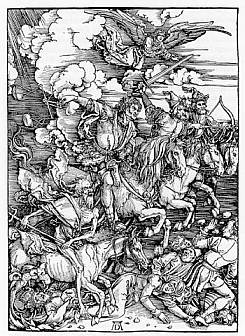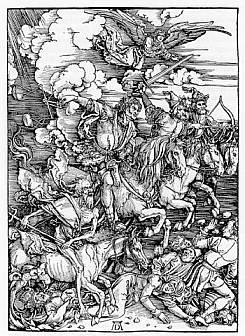 Matt Self of The Gad(d)about has stepped into the Blogosphere with both feet and made a mighty big impression. I think only the (now) ubiquitous Phil Johnson has entered more blogrolls more swiftly than Matt. I read The Gad(d)about every day via Bloglines, and not only do I like Matt’s take on a lot of issues (real level-headed charismatic ones, too!), but he’s probably the only Christian blogger I know that the two of us could get into the merits of Evans hydraulic heads while the rest of the world thought we were talking about cars.
Matt Self of The Gad(d)about has stepped into the Blogosphere with both feet and made a mighty big impression. I think only the (now) ubiquitous Phil Johnson has entered more blogrolls more swiftly than Matt. I read The Gad(d)about every day via Bloglines, and not only do I like Matt’s take on a lot of issues (real level-headed charismatic ones, too!), but he’s probably the only Christian blogger I know that the two of us could get into the merits of Evans hydraulic heads while the rest of the world thought we were talking about cars.
Now he wants to talk about the antichrist and eschatology. (Ooh, scary!)
{Word to Matt: You have to have been blogging for at least two years before you can post opinions on eschatology. It’s the Christian equivalent of the restriction on rabbinical students teaching The Song of Solomon.} 😉
Now I’m all for a good thrashing of Hal Lindsey or that Van Impish guy or whoever he is. And I like the fact that Matt nails the truth down that the spirit of antichrist in people who hate God is as much or more important than actually identifying he/she/it. But your eschatology really doesn’t matter all that much as long as you’re an ardent Christian? Hmm….
I used to think that one’s eschatological leanings made little difference, but after almost thirty years observing the Church, I don’t believe I could’ve been more mistaken. In actuality, people’s eschatology influences almost every single aspect of their lives, especially the way they walk out their interpretation of the Christian faith.
Dispensationalists, for instance, are always thinking about Israel in the light of eschatology. The rise of dispensationalism in the 20th century is one of the reasons that Israel exists as a state today. U.S. foreign policy revolves around dispensational eschatology in many regards. This is no small thing. Dispies have probably donated more money to Jewish causes looking to rebuild the Temple than anyone. And somewhere in Israel, right now as I type, some Lindsey-ite rancher is trying to genetically engineer a red heifer perfectly acceptable to the Lord.
The hardcore pre-tribbers of the Left Behind variety have their own issues. Much of their Christian praxis takes on a disposable mentality because “it’s all gonna burn.” They’re the ones who roll their eyes when some “eco-whackjob” starts talking about wise use of natural resources or preserving the Ivory-billed Woodpecker. If they could find a way to BBQ every known species of woodpecker over the world’s total supplies of coal and oil, they’d do it. At least to this writer, there’s a healthy model of living for today and there’s being psychotic about the whole thing.
Preterists are the stoners of the eschatological wars in that their view is, “Hey man, like it all happened in 70 AD, so we’re like free.” They live by one rule: “Whatever!” To get a preterist to get serious about building a Church that can withstand some persecution is like trying to get Woody Harrelson to stop toking and start planning for the day his movie career dries up. (Oops, too late!) All I can say is, “Wise virgins, foolish virgins.”
Now I just got done talking about postmillennialists and their “Onward, Christian Soldiers!” battle cry in my series on the business world. The “every day, in every way, we’re getting better and better” routine means you might as well flush your head down the john because there’s no way you’re going to get a postmill-er to acknowledge any kind of societal collapse theories. In some ways, the Latter Day Rain aficionados are in that same boat, thinking that worldwide revival is coming…coming…coming despite that fact that the entire West has pretty much traded in their Jesus card for the one that reads “Apostasy.” I don’t know about you, but I think the thinking behind “Jesus, now that you’ve returned, here’s the perfected Christian world we created for you!” takes a WEE bit of tweaking in light of Luke 18:8. (I’ll let you look that one up.)
As for the amillennialists, well, since they take everything figuratively, they just don’t believe anything, now do they?
My whole point here is not to make fun of the different eschatologies, but to point out that what you believe about Christ’s return, the end of the world, and the New Heaven and New Earth does make a difference in how you live out your faith.
I was twenty-six-years old when the infamous book 88 Reasons the Rapture Will Occur in ’88 was #1 with a bullet in Christian bookstores, so I actually remember the fallout from it fairly well. People who believed that numerological piece of detritus did all sorts of wacky things. Most of the senior class of Cedarville Bible College not far from me went out and got married rather than die virgins. People by the score around the country euthanized their pets rather than see Fluffy fall into the hands of the animal-sacrificing Satan-worshipers that would run rampant across the country once all the Christians had been raptured. I was working full-time at a Christian camp and that book was all the young summer staff people could talk about. And they changed their behavior—for good or ill—simply because of that book. I was in the midst of a serious relationship at the time and despite the fact that I thought the whole book was utter ungodly hogwash it still crossed my virginal mind once or twice that perhaps I’d never get to…well, you know. Group-think has power, let me tell you.
In the end, no one is a “pantribulationist.” (Note: it’s an old Mike Warnke joke—”I’m a ‘pantribulationist’ because it’s all going to ‘pan’ out in the end.”) Everything you and I believe about the End daily influences how we live (or don’t live) for the Lord and His Kingdom. Our views on evangelism and discipleship, our thoughts on preparing the Church for tribulation, the manner in which we raise our children, and our general view on daily living—all are influenced by our eschatology. If we “sensible people” were all truly pantribulationists then the Christian bookstores wouldn’t have any eschatological books in the Top 20 every time a world crisis erupts. But you and I know that’s not how it is in reality.
People’s eschatology governs their lives far more than we realize. The old aphorism is that there are no atheists in foxholes. Well, there’s no pantribulationists, either.
{Image: Woodcut, The Four Horsemen of the Apocalypse by Albrecht Dürer, 1498}
 One of the phenomena I’ve encountered in the portion of the blogosphere I regularly visit is an absolute mania for all things John MacArthur. In my post about Jack Hayford, I noticed that I, too, uttered the name that crops up everywhere I turn.
One of the phenomena I’ve encountered in the portion of the blogosphere I regularly visit is an absolute mania for all things John MacArthur. In my post about Jack Hayford, I noticed that I, too, uttered the name that crops up everywhere I turn.


 Matt Self of
Matt Self of